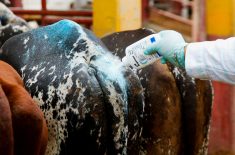British Columbia has introduced amendments to its animal cruelty legislation to boost the powers available for animal protection agents.
The amendments, announced Thursday, will boost penalties for offences and give agents of the B.C. Society for the Prevention of Cruelty to Animals greater leeway to step in on suspicion of cruelty or of people causing distress to animals.
A conviction in B.C. for causing distress to an animal now carries a penalty of up to $2,000 or up to six months in jail or both. The new legislation , when passed, will boost that maximum to $5,000 or six months or both for a first offence and $10,000, six months or both for a second offence, the province said.
Read Also

U.S. not ready to lift Mexican cattle ban over screwworm, Agriculture Secretary Rollins says
The U.S. is not yet ready to reopen its border to Mexican cattle amid an outbreak of the flesh-eating New World screwworm parasite, Agriculture Secretary Brooke Rollins said, but she is pleased with Mexico’s efforts to contain the pest.
The planned amendments also redefine “distress” to include situations where an animal’s well-being “is affected by inadequate ventilation, space, care or veterinary treatment,” the province said.
They’ll also allow agents working in remote areas of the province to get warrants by phone, and clarify agents’ authority to seize evidence and take abandoned animals into custody.
The new rules will also clarify the BCSPCA’s authority to both hold and dispose of animals, as well as animal owners’ obligation to compensate the BCSPCA for the costs of caring for held animals, the province said in a release.
Also under these amendments, people performing duties or exercising powers under the province’s Prevention of Cruelty to Animals Act will be granted immunity from legal proceedings claiming damages.
The Act authorizes the BCSPCA to assist “all captive animals” in distress, including farm animals, and to investigate offences.










